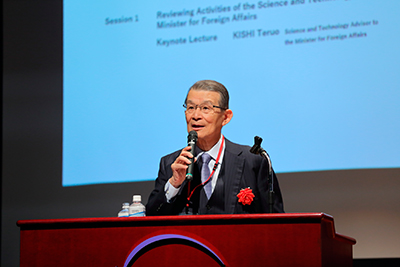Diplomatic Bluebook 2020
Chapter 3
Japan's Foreign Policy to Promote National and Global Interests
3 Science and Technology Diplomacy
Science and technology constitute the foundational elements for peace and prosperity that support socioeconomic development, and play a vital role in ensuring safety and security. By harnessing its own advanced science and technology, Japan promotes Science and Technology Diplomacy, thereby contributing to the development of science and technology at home and abroad, the promotion of relations with other countries, the peace and stability of the international community, and the resolution of global challenges. As part of this effort, Japan places emphasis on initiatives implemented through the activities of the Science and Technology Advisor to the Minister for Foreign Affairs.
Prof. Kishi Teruo (Science and Technology Advisor to the Minister for Foreign Affairs), who assumed office in September 2015, supports the activities of the Foreign Minister from the perspective of science and technology, and provides advice on the utilization of science and technology in the planning and coordination of various foreign policies to the Minister and relevant divisions. He also takes part in public relations activities concerning Japan's science and technology capabilities, while strengthening partnerships with Japanese and foreign stakeholders in the fields of science and technology. In April 2019, Prof. Kano Mitsunobu was newly appointed as the Science and Technology Co-Advisor to the Minister for Foreign Affairs to support the work of Prof. Kishi.
In 2019, the Advisory Board for the Promotion of Science and Technology Diplomacy, chaired by Prof. Kishi, was held in March, July, and November, during which various issues related to science and technology, and diplomacy were discussed. Prof. Kishi submitted the summary recommendations to TICAD7 from the March meeting, titled “Achieving an innovation ecosystem together with Africa,” to State Minister for Foreign Affairs Abe Toshiko, and the recommendations were reflected in Japan's initiatives at TICAD7.
Prof. Kishi also works in cooperation with the Cabinet Office and MOFA to promote public relations activities on science, technology, and innovation.12 He visited Argentina and Brazil in March, and Israel and Egypt in May, conducted lectures, and engaged in discussions with the relevant organizations and researchers on matters such as future potential for collaboration.
Prof. Kishi also puts effort into exchanging opinions with science and technology advisors of the governments of other countries, such as the U.S., the UK, and New Zealand, and into building and strengthening networks. In November, he introduced Japan's Science and Technology Diplomacy at the World Science Forum (WSF) held in Hungary, and deepened discussions with science and technology advisors from various countries at the meeting of the Foreign Ministries Science and Technology Advice Network (FMSTAN) held in Austria. MOFA co-hosted the 2nd Symposium on Science and Technology Diplomacy with the National Graduate Institute for Policy Studies (GRIPS) in December, and drew ideas from experts on the direction for Science and Technology Diplomacy. Furthermore, Prof. Kishi also regularly holds Science and Technology Diplomacy seminars to raise the level of knowledge within MOFA.
 2nd Symposium on Science and Technology Diplomacy (December 11, Tokyo; Photo: GRIPS)
2nd Symposium on Science and Technology Diplomacy (December 11, Tokyo; Photo: GRIPS)Japan has concluded 32 science and technology cooperation agreements, and these are now in force with 46 countries and the EU.13 Based on these agreements, it organizes regular joint committee meetings with these countries to engage in intergovernmental dialogue. In 2019, joint committee meetings were held with Canada, Germany, the U.S., the Netherlands, Australia, and the EU respectively. Attended by delegates from the relevant ministries and institutions, consultations were held on the current status of cooperation in diverse sectors, and on the future direction of cooperation.
With regard to multilateral cooperation, as a member of the Board of the International Science and Technology Center (ISTC) that supports research for peaceful purposes conducted by researchers on weapons of mass destruction from the former Soviet Union, Japan works together with the U.S. and the EU to provide support mainly to countries of Central Asia. Japan also participates in ITER projects to demonstrate the scientific and technological feasibility of nuclear fusion energy.
- 12 Project (known as “SIP Caravan”) to introduce the SIP (Strategic Innovation Promotion Program), which is a new type of Japanese national project for science, technology and innovation, spearheaded by the Council for Science, Technology and Innovation (CSTI) as it exercises its headquarters function to accomplish its role in leading science, technology and innovation beyond the framework of government ministries and traditional disciplines by facilitating coordination among government, industry and academic entities under 11 themes, in order to lay the groundwork for future international cooperation, as well as for the international dissemination of Japan's research and development output, through cooperation with the Ministry of Foreign Affairs (diplomatic missions overseas).
- 13 The Japan-USSR Science and Technology Cooperation Agreement was succeeded by Kazakhstan, the Kyrgyz Republic, Uzbekistan, Armenia, Georgia, Ukraine, Belarus, Moldova, Turkmenistan, and Tajikistan on different dates. The Japan-Czechoslovakia Science and Technology Cooperation Arrangement was succeeded by individual agreements with the Czech Republic and Slovakia in 1993. The Japan-Yugoslavia Science and Technology Cooperation Agreement was succeeded by individual agreements with Croatia, Slovenia, Macedonia (country name at the time), Serbia, Bosnia and Herzegovina, and Montenegro on different dates.
